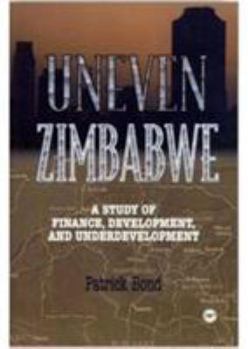Uneven Zimbabwe: A Study of Finance, Development and Underdevelopment.
Select Format
Select Condition 
Book Overview
No Synopsis Available.
Format:Paperback
Language:English
ISBN:0865435391
ISBN13:9780865435391
Release Date:January 1998
Publisher:Africa Research and Publications
Length:515 Pages
Related Subjects
Business Business & Investing Economics History Political Science Politics & Social SciencesCustomer Reviews
2 ratings
Best book yet on Zimbabwe
Published by Thriftbooks.com User , 25 years ago
This is the best book yet on Zimbabwe's political economy. It is full of detailed information on how and why Zimbabwe has become what it is. I particularly appreciated Bond's casting of this in the era of globalisation and the differing effects money capital has had on the country. This book's theoretical framework could usefully be deployed to other African countries, not least South Africa. His Marxist stance is welcome, in era where neo-liberalism has achieved hegemonic status. An excellent work, definitely worth getting.
A must read for those interested in the region's economies
Published by Thriftbooks.com User , 25 years ago
Rarely has a specialist in Marxist crisis theory applied their skills to an African economy with the rigour of Patrick Bond. This lengthy study makes great advances in placing the economic problems of a small African country into a global context. Bond's main aim is to demonstrate how the collapse of the Zimbabwean economy in the 1990s is a product of both the specifics of the country and the forces of globalisation. In his view, the phenomena of overproduction and overaccumulation have very specific manifestations in Zimbabwe. He depicts several such manifestations, including boom and bust on the stock exchange and the rise and fall of property speculation. For Bond, however, these problems are rooted in a colonial history which created an economy based on a cheap black labour force. In his view, such an "uneven" economy could never sustain consumption levels adequate to ensure continued growth. As a result, the luxury consumer goods industries which targeted the white settler markets were bound to result in excess capacity. However, given the structure of the global economy, Zimbabwe ultimately had no outlet to solve this problem of overproduction. For Bond, this cul de sac lay behind earlier downturns in the economy but reached its most staggering proportions with the implementation of structural adjustment in the 1990s. The author holds out little hope for economic policy measures as a solution to Zimbabwe's poverty and inequality. Rather he posits the need for a transformation of the economic and political institutions of the country--based on the struggles and leadership of social movements. Unlike many Marxists, Bond does not leave everything to the inevitable advance of the "laws" of the capitalist system. Instead, he presents rich detail of the country's production and financial sector as well as linking the economic evolution of the crisis to the degeneration of the political leadership of the ruling ZANU-PF political party and the weakness of civil society forces. For anyone who is interested in the economies of the region, this is a major advance of our understanding of the linkages between southern African economic problems and the broader global economy. Although Bond's work is the result of Ph.D. research--he is no academic tourist. He has spent years in the region and displays the type of local knowledge that cannot be gained in First World libraries or via cyberspace. Despite its strengths, the volume has a few shortcomings. In one sense the richness of detail may detract from a broader interest which the book could attract. For readers who are not immediately familiar with Enos Nkala, Bernard Chidzero or Hunyani Paper, the extensive statistical and descriptive sections may be a bit too obscure to fully digest. Moreover, despite all the advances in our understanding of gender and development, Bond has not escaped the confines of the economy's commanding heights to seriously examine the





